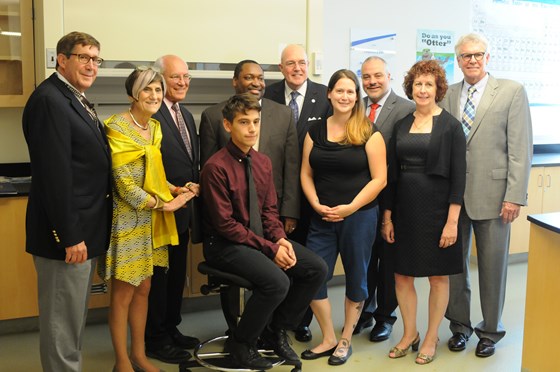
Reps. DeLauro and Tonko Visit New Haven to Learn More About Opportunities Created by Public Utility Degree Programs
Aug 29, 2018Nearly 40 percent of the approximately 550,600 utility employees in the United States are eligible for retirement within the next five years, at the Regional Water Authority (RWA), that number is closer to 50 percent. Representative Rosa DeLauro (CT-3) and Representative Paul Tonko (NY-20) visited Gateway Community College (GCC) today to learn how educators there and at Southern Connecticut State University (SCSU) are working with the RWA and other state utilities to create a school-to-utility-work pipeline and ensure a new generation of employees is trained and ready to fill the jobs left by retiring workers.
“One of Connecticut’s greatest strengths is our world-class public institutions of higher education, which ensure students entering the workforce are equipped to meet the demands of a modern economy in all sectors, including public utilities,” said Representative Rosa DeLauro. “Innovative educational opportunities like the Public Utility Management Degree program help ensure Connecticut’s students have a clear path to good-paying jobs. I am proud of the partnership RWA has developed with Gateway and SCSU, and I will continue working in Congress to secure funding for job training and higher education.”
“Every life and job depends on reliable access to high-quality water, and we need to ensure that a future generation of utility employees is trained and ready to deliver on this important responsibility,” said Representative Paul Tonko. “Much of America’s water workforce is aging and approaching a well-deserved retirement. I am glad to hear that Connecticut utilities and educators are finding innovative ways to address this situation. We need to take steps now to address a similar shortage of utility workers that is already impacting communities across our nation.”
“The establishment of this program in Public Utilities Management is another great example of how community colleges form collaborative partnerships to meet workforce needs,” explained Paul Broadie II, President of Gateway Community College. “We are nimble and responsive to the need, and committed to working closely with our partners to offer students a pathway to employment once their studies are complete.”
“At Southern, one of our commitments is to meet the evolving needs of the workforce in Connecticut and beyond,” said Joe Bertolino, President of Southern Connecticut State University. “This unique collaboration between public higher education and public utilities is exactly the type of program that will accomplish this goal, providing students with the skills they will need to assume leadership roles in public utility management nationwide.”
“Public utilities face a potential watershed in the shortage of young people applying to take the place of our aging and retiring workforce,” said Larry Bingaman, President and CEO of the RWA. “It is this challenge that led to a unique partnership creating the Public Utility Management Degree programs at GCC and SCSU. Their success will allow the RWA and other utilities to continue delivering our life-sustaining products and services for generations to come."
Students can begin pursuing a degree in Public Utility Management at GCC, where they can attain an associate degree in two years. Following that, students can choose to transfer to SCSU to complete their Bachelor of Science degree in Public Utility Management. Both degrees offer a mix of courses designed to prepare students for work with a utility. Course subjects include environmental sustainability, financial accounting, asset and infrastructure management and other subjects related to work in the public utilities. Students graduating from these programs will be equipped to fill managerial and technical job openings at the RWA and other utilities. The RWA and other utilities are also offering internships to students in these programs.
Utilities are major employers in Connecticut and around the United States. Utilities provide approximately 10% of all job opportunities in Connecticut, and represent one to two percent of total employment in metropolitan and rural areas of the United States. The Connecticut Department of Labor estimates that there are 5,000 people employed with a utility in the state of Connecticut.
In addition to being major employers and economic drivers throughout the country, utilities have also been recognized for offering excellent opportunities for jobseekers. A recent study from the Brookings Institute examined utility employment and highlighted the potential this sector offers for entry-level employees to discover long-term careers. Utilities offer above-average wages, low barriers to entry and an aging workforce means there is opportunity for upward mobility and growth.
Since first suggested by Larry Bingaman in 2015, the Public Utility Management Degree programs have grown at GCC and SCSU. Students interested in pursuing a degree in public utility management are encouraged to reach out to academic counselors to learn more.





